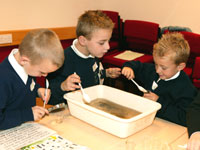How to run a science club
The BA supports a network of schools across the UK who use our enrichment activities in science clubs.
What to do with your science club?
Why run a science club?
A successful science club can:- motivate and encourage students of all ages and abilities
- allow students to explore their own interests and ideas
- develop problem-solving skills
- stretch gifted and talented students
- build confidence of all students
- provide opportunities for formative assessment
- help build management skills of new staff
- encourage links between schools and industry
- provide publicity opportunities for your school or department
How to run a science club?
Many science clubs are run during lunchtime or after school. However, you can run science club activities during normal curriculum time, e.g. between topics, or in short bursts, e.g. at the end of term or during National Science Week.
Science clubs can be run jointly between primary and secondary schools, helping bridge the gap between the two.
You can get support for your club from the BA, from SETPOINTs and from , the science discovery clubs network. Your local may be able to provide Science and Engineering Ambassadors (SEAS) to help deliver activities.
You might also find it useful to search our online directory of science presenters You can search by subject, age range or area of the country and read reviews of the presenters.
What to do with your science club?
Try out the following:
- Investigations and projects
- Award schemes e.g. the BA award schemes, Young Engineers, Salters schemes
- External trips e.g. to local industries, science centres or science discovery days
- Egg race challenges
- Science fairs
- Science communication activities e.g. debates, drama, journalism
- Concept cartoons
- Competitions
- Guest speakers e.g. parents, scientists, SEAS


